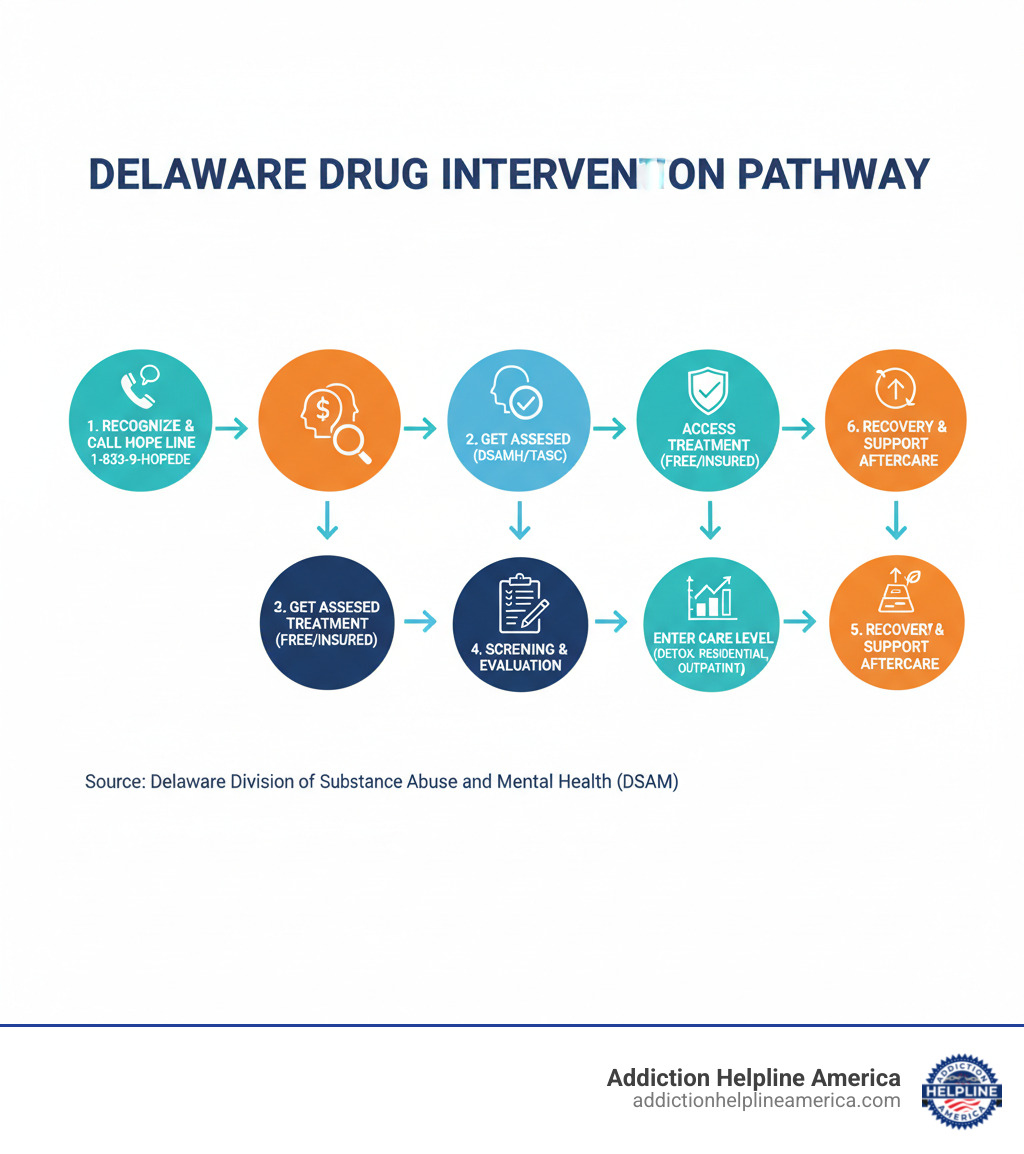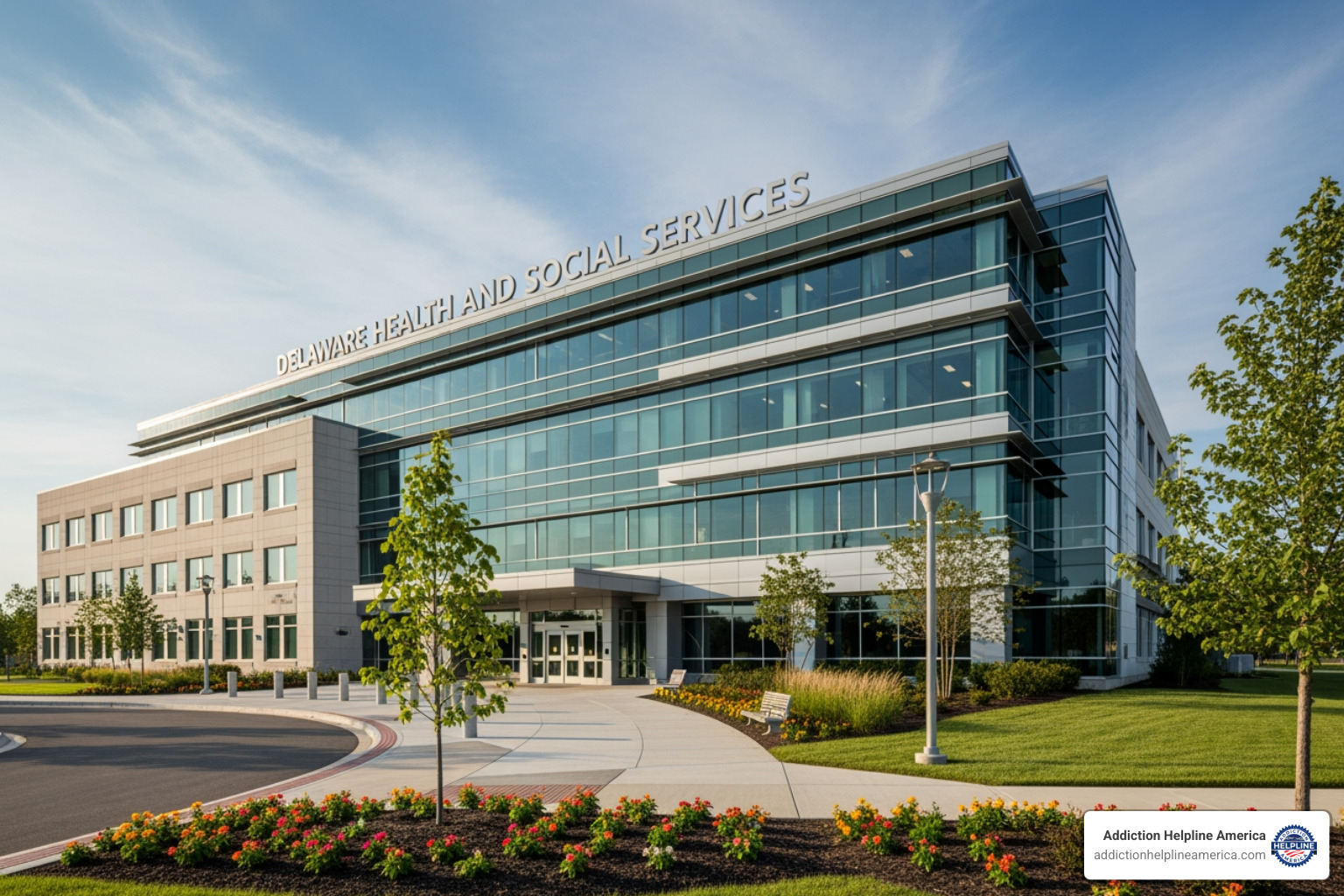
Why Families in Delaware Need Drug Intervention Services Now
Drug intervention Delaware services connect families facing addiction with life-saving treatment and support. If you or someone you love is struggling with substance use, here’s how to get help immediately:
Quick Access to Delaware Drug Intervention:
- Call the Delaware Hope Line: 1-833-9-HOPEDE (24/7 support)
- DSAMH Consumer Hotline: 855-649-7944 (state services)
- Emergency Crisis Support: Visit HelpIsHereDE.com
- Find Treatment: Search state-vetted providers through DSAMH
- For Justice-Involved: Treatment Access Center (TASC) at (302) 577-2484
Delaware has consistently ranked among the top five states with the highest drug overdose death rates. From 2016 to 2021, the state saw a devastating 69% increase in overdose deaths. While 2024 brought a 36% decrease compared to 2023, the crisis remains urgent—with over 60,000 Delawareans struggling with alcohol abuse and more than 3% battling drug addiction.
Intervention is not just confrontation. It’s a structured process that helps families shift how they communicate, set boundaries, and guide loved ones toward treatment. Delaware offers a comprehensive network of state-funded treatment services, specialized court programs, and community support designed to meet families where they are.
The good news? You don’t have to wait for your loved one to hit rock bottom. Delaware’s Division of Substance Abuse and Mental Health (DSAMH) provides free treatment services for uninsured residents, crisis intervention available 24/7, and direct pathways to care through programs like the Treatment Access Center (TASC).
At Addiction Helpline America, we’ve spent years connecting Delaware families to effective drug intervention services, guiding them through the state’s treatment network and helping them find the right support at the most critical moments. We understand the fear, confusion, and urgency you feel—and we’re here to help you steer every step of this journey.
Understanding Delaware’s State-Led Support System (DSAMH)
When you’re searching for help with addiction in Delaware, there’s one organization you need to know about: the Division of Substance Abuse and Mental Health (DSAMH). Think of DSAMH as Delaware’s central hub for drug intervention Delaware services and mental health support.
DSAMH operates as part of Delaware’s Department of Health and Social Services, and their job is to make sure every resident can access the care they need. They don’t run all the treatment centers themselves—instead, they contract with private agencies across the state to deliver services. This approach lets them maintain quality standards while reaching people in every corner of Delaware.
What makes DSAMH so important for families seeking drug intervention Delaware support? They take a complete view of public health. That means they’re not just focused on treatment—they’re also working on prevention programs, crisis intervention when things get urgent, and long-term recovery support to help people stay on track.
If you’re feeling overwhelmed about where to start, DSAMH is your first call. They’ll help you understand what’s available, what you qualify for, and how to access it.
How to Access Publicly Funded and Free Treatment
Here’s something that surprises many Delaware families: you can get free addiction treatment even if you don’t have insurance. DSAMH makes sure that money never stands between someone and life-saving care.
If you’re uninsured or your insurance doesn’t cover what you need (that’s called being underinsured), you may qualify for publicly funded services through DSAMH. This isn’t some limited program with long waiting lists—it’s a real pathway to comprehensive treatment.
The process starts with a simple phone call to DSAMH. They’ll walk you through a screening and evaluation to figure out what level of care makes sense for your situation. Every person is different, and they understand that. For step-by-step details on accessing these services, check out the Guide to Accessing Treatment on Delaware’s official site.
What if you do have insurance? DSAMH still helps. They can guide you to providers who accept your coverage, making enrollment smoother and less confusing. The goal is always the same: get you or your loved one into treatment as quickly as possible.
Core Services Offered Through DSAMH
DSAMH coordinates an impressive range of services, mostly delivered through their network of contracted private agencies. These services cover every stage of recovery, from your first assessment to long-term support.
Screening and evaluation is where everything begins. Trained professionals assess your situation and recommend the right treatment approach. From there, you might move into outpatient counseling, which lets you live at home while attending therapy sessions—perfect for people with work or family responsibilities.
For those battling opioid addiction, DSAMH offers opioid treatment programs including methadone maintenance and other forms of medication-assisted treatment. These programs combine medication with counseling for the best chance at recovery.
If you need more intensive support, residential services provide 24/7 care in a structured environment. This includes short-term programs (30 days or less), long-term treatment for deeper healing, and halfway houses that help you transition back to independent living.
Detoxification services offer medically supervised withdrawal, keeping you safe and as comfortable as possible during those difficult first days. And for ongoing support, case management services connect you with resources, help you steer insurance, and keep your recovery plan on track.
Beyond direct treatment, DSAMH also provides Crisis Intervention Services (CIS) for mental health emergencies and substance-related crises. The goal is to prevent unnecessary hospitalizations by providing immediate, appropriate support when someone is in distress.
Prevention programs work to stop addiction before it starts, strengthening children, families, and communities through education and training. Peer services connect you with people who’ve walked this path themselves—there’s nothing quite like talking to someone who truly understands.
The Delaware Psychiatric Center (DPC) serves adults dealing with severe mental illness alongside substance use disorders, recognizing that these issues often occur together. And for homeless individuals facing addiction, specialized services address the unique challenges of finding stability while pursuing recovery.
Finding Help and Contact Information
You don’t have to steer this alone. Delaware has set up clear pathways to get help fast.
The DSAMH Consumer Issue Resolution Hotline at 855-649-7944 is your direct line for questions about services, enrollment issues, or concerns about care. Real people answer these calls and genuinely want to help.
For broader support any time of day or night, call the Delaware Hope Line at 1-833-9-HOPEDE (833-946-7333). This 24/7 service connects you with clinicians, peer specialists, and crisis support. You can also visit Help Is Here DE for additional resources and information.
Looking for specific treatment providers? DSAMH maintains a Provider Directory with details on agencies across the state. You can access it through their website in formats that are easy to search.
At Addiction Helpline America, we’ve made it our mission to connect Delaware families with the right resources at the right time. We understand the urgency you feel and the questions keeping you up at night. Our Addiction Helpline America Delaware Resource Page offers comprehensive listings and personalized guidance to help you find treatment that fits your specific situation.
The most important thing? Make that first call. Whether it’s to DSAMH, the Hope Line, or us at Addiction Helpline America, reaching out is the bravest step you’ll take.
Types of Addiction Treatment Available in Delaware
Finding the right treatment for a loved one struggling with addiction means understanding what’s available and how each option fits their unique needs. Delaware’s drug intervention Delaware system recognizes that recovery isn’t a straight line—it’s a journey that requires different levels of support at different times.
That’s why the state offers what’s called a continuum of care: a full spectrum of treatment options that can adapt as someone moves through recovery. Whether your loved one is just beginning to acknowledge a problem or has been battling addiction for years, there’s a level of care designed to meet them exactly where they are.
One of the most important aspects of Delaware’s approach is addressing co-occurring disorders—when someone struggles with both addiction and mental health challenges like depression, anxiety, or trauma. Research shows that more than half of people with substance use disorders also experience mental health conditions, which is why effective treatment must address both simultaneously. Delaware’s system integrates mental health services throughout the treatment process, ensuring that underlying issues aren’t left unaddressed.
Levels of Care for Substance Abuse
Think of addiction treatment as a ladder—each rung offers different intensity and structure based on where someone is in their recovery. Some people need to start at the most intensive level, while others may begin with outpatient support. The key is matching the level of care to the person’s current needs, medical condition, and life circumstances.
Detoxification (detox) is often the first step for people with physical dependence on alcohol or drugs. This medically supervised process helps the body safely withdraw from substances while managing uncomfortable or potentially dangerous symptoms. Detox typically lasts a few days to a week and provides 24/7 medical monitoring. While it’s a critical first step, detox alone isn’t treatment—it simply prepares someone for the therapeutic work ahead.
Residential services provide round-the-clock care in a structured, substance-free environment. Delaware offers both short-term residential treatment (usually 30 days or less) for people who need intensive support but have stable living situations to return to, and long-term residential treatment for those requiring extended care, often lasting 90 days or more. These programs combine individual therapy, group counseling, skill-building, and daily structure to help people develop new patterns and coping strategies.
Halfway houses bridge the gap between residential treatment and independent living. These transitional environments provide accountability, peer support, and continued access to counseling while residents begin working or attending school. They’re particularly valuable for people who’ve completed residential treatment but aren’t quite ready to return to their previous living situation.
Intensive Outpatient Programs (IOP) offer serious treatment without requiring someone to live at a facility. People in IOP typically attend therapy sessions several times per week for several hours at a time while continuing to live at home, work, or attend school. This level works well for people who have completed residential treatment, need more than weekly counseling, or have strong support systems at home.
Outpatient Counseling (OP) provides the most flexible option, with therapy sessions once or twice a week. This level suits people with mild to moderate substance use issues, those stepping down from more intensive care, or individuals who need ongoing support to maintain long-term recovery. Outpatient services allow people to fully participate in daily life while still receiving professional guidance.
| Level of Care | Description | Typical Duration |
|---|---|---|
| Detoxification | Medically supervised withdrawal with 24/7 monitoring | 3-7 days |
| Residential (Short-term) | Intensive, structured treatment in a live-in facility | 30 days or less |
| Residential (Long-term) | Extended intensive treatment with comprehensive support | 90+ days |
| Halfway Houses | Transitional living with accountability and peer support | 3-12 months |
| Intensive Outpatient (IOP) | Multiple weekly therapy sessions while living at home | 6-12 weeks |
| Outpatient Counseling (OP) | Weekly therapy sessions with maximum flexibility | Ongoing, as needed |
Specialized Treatment Approaches
Beyond choosing the right level of care, effective treatment uses evidence-based approaches proven to help people recover. Delaware providers incorporate several specialized methods custom to different types of addiction and individual needs.
Medication-Assisted Treatment (MAT) combines FDA-approved medications with counseling and behavioral therapies. This approach is particularly effective for opioid use disorder, using medications like methadone and buprenorphine to reduce cravings, prevent withdrawal, and block the euphoric effects of opioids. Despite outdated stigma, MAT is considered the gold standard for opioid addiction—studies show it significantly reduces overdose deaths and helps people stay in treatment longer.
Delaware has expanded access to MAT through the State Opioid Response (SOR) Initiative, which funds additional treatment capacity, trains more providers to prescribe these medications, and reduces barriers to care. This initiative recognizes that medication is often a necessary tool in fighting the opioid crisis.
Cognitive Behavioral Therapy (CBT) helps people identify and change thought patterns that lead to substance use. Through CBT, individuals learn to recognize triggers, develop healthier coping skills, and challenge beliefs that perpetuate addiction. This structured, goal-oriented approach has proven effective across all types of substance use disorders.
Trauma-informed care acknowledges that many people struggling with addiction have experienced significant trauma—abuse, neglect, violence, or loss. Traditional treatment approaches can sometimes re-traumatize people without meaning to. Trauma-informed care creates safety, builds trust, and addresses the underlying wounds that often fuel addiction. Providers trained in this approach understand that “what happened to you” is just as important as “what’s wrong with you.”
At Addiction Helpline America, we’ve helped countless Delaware families steer these treatment options. We understand that the terminology can feel overwhelming and that every person’s situation is different. Whether you’re looking for a program that offers MAT, specializes in trauma, or provides the structure of residential care, we can help you find providers that match your loved one’s specific needs. You can explore more about treatment options through our Delaware Guidance Services Resource or browse our comprehensive Delaware Resource Page.
Our helpline is 100%
free & confidential
If you or someone you care about is struggling with drug or alcohol addiction, we can help you explore your recovery options. Don’t face this challenge alone—seek support from us.
Programs
Resources
Will my insurance
cover addiction
treatment?
We're ready to help
Find the best
drug or alcohol treatment
center
Are you or a loved one struggling with addiction? Call today to speak to a treatment expert.






